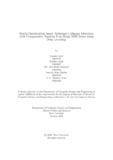Multi-classification based Alzheimer's disease detection with comparative analysis from brain MRI scans using deep learning
Date
2021-10Publisher
Brac UniversityAuthor
Kabir, AzmainKabir, Farishta
Mahmud, Md. Abu Hasib
Sinthia, Sanzida Alam
Azam, S. M. Rakibul
Metadata
Show full item recordAbstract
The neurodegenerative Alzheimer's Disease is the most widely recognized cause of
`Dementia' and was allegedly the 7th highest cause of death globally. Nevertheless,
there is still no conclusive test for distinguishing Alzheimer's disease. Our proposed
model eliminates these challenges in an effective manner. The technique fits and
analyzes different classes in a single setting and requires signi ficantly less previ-
ous apprehension. Several handcrafted or prede ned machine learning and deep
learning models have been implemented in this fi eld of study. Our proposed multi-
classi cation model is primarily implemented based on the Open Access Series of
Imaging Studies (OASIS) data and suggests an 18-layer architecture. We have im-
plemented a unique preprocessing approach of all three anatomical planes of the
MRI scans in a single sequential model, which was also evaluated afterward. The
research also explores a comparative study among multiple and binary classes in
terms of performance and effciency. Prede ned models such as InceptionV3 and
VGG19 have also been brought to comparison to measure the model's reliability.
Our multiclass setting shows an accuracy of over 80%, which is higher than most
of the existing multi-classi fication models in this dataset. Moreover, the in-depth
comparative study using binary classi cation shows a signi ficant accuracy of over
92%, which ensures the overall efficacy of the model.

